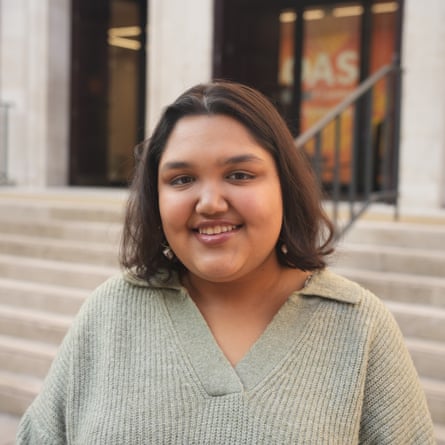‘Studying at Soas feels like being at the centre of the world’: the student experience at a truly international university
Growing up in Mumbai, Shloka Murarka received an education based on a UK curriculum. Literature classes featured all the usual writers from the west (Shakespeare, Orwell, et al), but slim pickings from an Indian literary canon which stretches back to 1500BC and has produced authors such as RK Narayan and Arundhati Roy. It was the same when it came to geography. “We’d learn about how seasons worked in Europe or North America, which is where the textbooks were written, but there was hardly anything in these books telling us about climate in the Indian subcontinent,” she says. “This education was seen as ‘elite’, but also meant we weren’t sensitised to local issues.”
The legacy of colonial education in India was partly why Murarka opted to enrol on an economics degree at Soas University of London. Murarka’s BSc degree – like most of the courses at Soas – follows a decolonial approach, focusing on the history, culture and academic thinking of Africa, Asia, the Middle East and their diasporas (which collectively comprise three-quarters of the world’s population). Murarka only started her course last September (arriving in London the same week as the mini-budget probably gave her the perfect introduction into the flaws of western economics) but has already crafted a “radical reading list” for her course, including writers such as Guyanese academic [and Soas alumnus] Walter Rodney and Indian economist BR Ambedkar.

“Because I want to work in developing countries for developing countries, I didn’t want to learn about UK/US economics,” says Murarka. “It makes sense to have that decolonial perspective. Even if it’s strange coming to the UK and learning less western thought than I did back home.”
Soas’s decolonialised outlook is a big draw for its 5,500-plus students. Unlike the Eurocentric curriculums at other universities, Soas students learn from a varied palette of perspectives, spanning everything from Muslim philosophy to African languages such as Zulu and Yoruba. This equips them with the skills and knowledge needed to work in an increasingly multipolar world, where many problems facing us – from the climate crisis to geopolitical tensions – are global rather than national. Indeed, Soas is ranked in the top 50 universities of the world for internationalism and is sixth-best in the UK for employment outcomes, according to the 2023 QS world university rankings (recent Soas graduates are currently working at Amnesty International, the BBC and the World Bank).
This global outlook imbues students with the savoir-faire needed to become a “global citizen”, one of Soas’s aims. “When students attend university, they don’t just acquire knowledge, but pick up skills such as critical reasoning and time management,” says Murarka. “But when you learn about the entire world, you acquire a deep sense of empathy too.”
With students from more than 133 countries, Soas’s cosmopolitanism is mirrored in undergraduate life too. “Studying here feels like the centre of the world,” says Murarka of Soas’s central London location next to the British Museum. Many students live in halls of residence in the surrounding literary hub of Bloomsbury, enjoying the university’s library (more than 1.5m volumes in more than 400 languages) and a sublime Japanese-style roof garden. Whenever she yearns for home, Murarka enjoys the Indian restaurants and groceries of nearby Drummond Street.
Murarka and her friends recently hosted a “pot luck” dinner, with each guest bringing food from their home countries; a night that took in French quiche, South African wine and Murarka’s cheela/chilla (Indian chickpea flour crepes). She’s looking forward to this summer, when she’ll be interrailing around Europe, staying at the parental homes of her new student pals.
This rich cultural diversity is reflected in the 100-plus Soas student societies and clubs. There’s a Chinese Music Ensemble (Silk & Bamboo), a Dead Philosophers Society, plus groups dedicated to origami, herbs, mahjong and circus skills. Murarka recently celebrated Diwali with fellow members of the Desi Society.
The student societies also extend to campus activism. Last summer Soas Detainee Support staged demonstrations protesting the UK government’s plans to send asylum-seekers to Rwanda, while previous campaigns have seen students fight to save the university’s Latin American cleaners from deportation (2009).

Since its founding in 1916, Soas has displayed a staunchly internationalist spirit, attracting students and staff from across the world. Alumni include luminaries such as US singer/civil rights campaigner Paul Robeson, shadow foreign secretary David Lammy, journalist Zeinab Badawi, along with myriad other heads of state, writers and academics.
Soas students and staff at the university are involved in groundbreaking work. In 2014, Prof Dan Plesch uncovered documents which showed that the UK released hundreds of Nazis after the Holocaust, including Auschwitz guard Oskar Gröning, who was later brought to justice. More recently, Lavinya Stennett developed a Black history curriculum while still a student, which is currently being used in British schools.
Murarka, who has ambitions to become an academic herself, is regularly enthralled by the wattage of her lecturers, whether it’s discovering that Soas professor Guy Standing coined the word “precariat” or stumbling upon books by economics professor Costas Lapavitsas in her local secondhand bookstore. The high number of Soas academic staff from Black, Asian, mixed and other backgrounds (at 41%, it’s nearly three times the figure for British universities overall) isn’t lost on Murarka either.
“One big realisation upon coming here is that the faculty is diverse, not just the students,” she says. “You don’t feel like a minority coming in … there are people who look like me.”
Find out more about opportunities to study at Soas, and the extensive range of courses it offers
For more latest Education News Click Here

